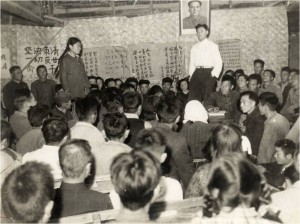China
Protected: Friday, 04/18 Paola Zamperini, “色xting. Narrating Sex in Ming and Qing fiction”
Protected: 02/13 Fabio Lanza, “Facing Thermidor: Global Maoism at its Ends”
Protected: Friday 5/31: HyunHee Park, “Women tearing the Screen: Strait of Choson (1943) and Wartime Melodrama”
Protected: Ling Zhang, “Spacing Sound, Sounding Body: Soundscape in 1920s-1940s Chinese Cinema” 4/19
EVENT RESCHEDULED: Mock Job Talk by Chunchun Ting, “The “Besieged City” – Ann Hui’s Cinematic Portraits of the Homely and the Unhomely” January 25
This event has been rescheduled for January 25:
The “Besieged City” – Ann Hui’s Cinematic Portraits of the Homely and the Unhomely
Abstract:
This paper focuses on the “besieged city” of Tin Shui Wai, a remote new town in Hong Kong made infamous by its shocking number of family murder and suicide cases. In both its generic urban form and unique social tragedy, Tin Shui Wai is representative of the working class suburban towns expanding at the periphery of many cities. My study pursues two lines of inquiry. The first one examines family dysfunction in a bedroom community like Tin Shui Wai to consider the relation between the actual space of the home and its urban setting. My second question is specifically about media representation of the disadvantaged and dispossessed. As Tin Shui Wai’s heightened media exposure raised public sympathy and provoked social discrimination, its case questions the relationship between visibility and empowerment, and interrogates the claim of Hong Kong as a collective home by drawing attention to its internal exclusion. I look at Hong Kong director Ann Hui’s two films on this neighborhood – The Way We Are (2008) and Night and Fog (2009) – to explore these two sets of questions. I contrast the homely portrait of a single-parent household in The Way We Are with the attempt to capture a sense of uncanny in Night and Fog. While the former attests to the resilience and agency of ordinary people in reshaping their environment and community, the latter reveals Tin Shui Wai’s built environment as a misleading urban façade concealing a diametrically opposed social reality. As the two films follow the movement from the homely to the unhomely, they form an important whole that provides fresh insights into Tin Shui Wai and the contemporary world, by leading their viewers to look at individual lives in this ill-famed neighborhood, and to reflect on a more general human condition that far exceeds the boundary of the “besieged city.”
Ting’s talk will be held on Friday, January 25 from 3:00-5:00, in Judd Hall, room 313.
This workshop is sponsored by the Council on Advanced Studies in the Humanities. Persons who believe they may need assistance to participate fully, please contact the coordinator (Joshua Solomon) in advance at: joshua.lee.solomon@gmail.com
Protected: 10/19 Hao Jian, “Independent Fiction Film in Mainland China”
Andrew Kipnis, Nov. 11th, “Constructing Commonality.”
The Art and Politics of East Asia workshop presents:
Andrew Kipnis
Senior Fellow, Anthropology, Australian National University
“Constructing Commonality: Standardization and Modernization in Chinese Nation-Building”
ABSTRACT: This essay examines the importance of Chinese nation-building in the contemporary era. Defining nation-building in terms of processes that help to bridge local differences especially but not only when also distinguishing China from the rest the world, I argue that a focus on globalization has masked the importance of Chinese nation-building to contemporary social change. I analyze three very different societal arenas in which national forms of commonality are being constructed: the consolidation of the education system, the expansion of the urban built environment and the spread of the Chinese internet. Though each arena illustrates a very different aspect of the nation-building process, they all result in an increased degree of commonality in lived experience and communicative practice across China.
Friday, November 11th,
3:00-5:00pm
Judd Hall, Room 313
5835 S. Kimbark Ave. Chicago, IL 60637
This workshop is sponsored by the Center for East Asian Studies and the Council on Advanced Studies in the Humanities. Persons who believe they may need assistance to participate fully, please contact the coordinator (Daniel Johnson) in advance at: djohn at uchicago.edu
Professor Matthew Johnson, 10/20 (Thursday) Mass Culture in Maoist China: Archival Perspectives and Methodological Challenges.
Transregional Histories Workshop and Art and Politics of East Asia Workshop present:
“Mass Culture in Maoist China: Archival Perspectives and Methodological Challenges.”
Matthew Johnson
Assistant Professor of History, Grinnell College
Oct. 20 (Thursday) 4:00-6:00 p.m.
John Hope Franklin Room (SS224)
*Note the change in date, time, and location from APEA’s normal meeting time and place*
Persons with a disability who need assistance, please contact Jun Hyung Chae (jhchae at uchicago.edu) or Daniel Johnson (djohn at uchicago.edu) in advance.
Tuesday October 12th- Professor Chen Yongchao
the Art and Politics of East Asia Workshop
presents
Chen Yongchao
陈泳超
Assistant Professor, Chinese Literature Department
Peking University
北京大学中文系民间文学教研室副教授
The Folksongs of Rural China
Through 60 Years of Intellectual Transformation
一个民歌乡在国家思潮变动中走过的60年
Tuesday, October 12th
3:00-5:00pm
Judd 313
5835 S. Kimbark Ave. Chicago, IL 60637
A lecture and discussion on the historical relationship between folksong and the literary and artistic policy of the People’s Republic of China by a leading folklorist from Peking University.
Talk and discussion to be conducted in Chinese with English Translation
This workshop is sponsored by the Center for East Asian Studies and the Council on Advanced Studies in the Humanities. Persons who believe they may need assistance to participate fully, please contact the coordinator at maxb@uchicago.edu in advance.
